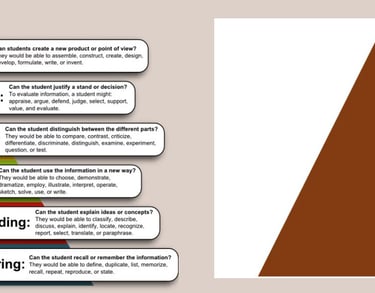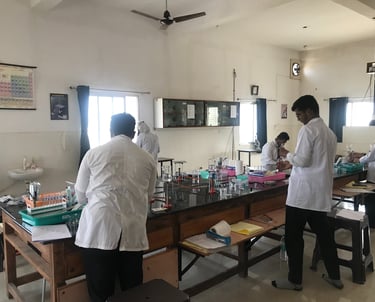PROBLEM -BASED LEARNING (PBL)
Problem-Based Learning (PBL) is an innovative teaching approach that focuses on engaging students with real-world problems as a way to develop their critical thinking, problem-solving, and collaborative skills. Instead of traditional lecture-based teaching, PBL emphasizes active learning, where students take responsibility for their learning journey and apply knowledge to solve complex, authentic challenges.


Key Features of Problem-Based Learning
Student-Centered Approach:
PBL shifts the focus from teacher-driven instruction to student-driven exploration.
Students actively participate in identifying problems, researching solutions, and presenting findings.
Problem-Driven Learning:
The learning process starts with a real-world problem or scenario.
These problems are typically open-ended, requiring students to investigate, hypothesize, and experiment.
Collaborative Learning:
Students work in teams, encouraging collaboration, communication, and peer learning.
Each group member contributes unique perspectives to the solution process.
Role of the Teacher as Facilitator:
Teachers act as guides or mentors, helping students navigate the problem-solving process rather than providing direct answers.
This allows students to develop independence and confidence in their abilities.
Interdisciplinary Learning:
Problems often span multiple subjects, helping students connect knowledge from different fields.
For example, solving a problem about renewable energy might require knowledge of physics, chemistry, economics, and social sciences.
We have introduced a problem-based learning system in our school, which incorporates concept labs. We strongly believe that without a solid understanding of concepts, problem-solving becomes challenging. Therefore, we have designed our curriculum to focus on building concepts effectively, efficiently, and for a lifetime for all students, regardless of their personality types. We believe that the best way to achieve this is through demonstrations and experiments, as they provide a hands-on learning experience for everyone. Our aim is to ensure that every student gains a deep understanding of the concepts, enabling them to excel in problem-solving and develop critical thinking skills.


Why the Shift from CBL to PBL?
Content-Based Learning focuses primarily on the transmission of information, where students are passive recipients of knowledge. While effective in some contexts, this approach often limits the ability to deeply engage students and connect learning to practical applications.
On the other hand, Problem-Based Learning emphasizes:
Conceptual Understanding:
Moving beyond rote memorization, PBL prioritizes teaching concepts, ensuring students grasp the 'why' and 'how' behind the knowledge.Application of Knowledge:
Students are trained to apply concepts in solving real-life problems, fostering critical thinking and analytical skills.Active Engagement:
Through demonstrations, experiments, and interactive discussions, students actively participate in their learning journey.Enhanced Problem-Solving Abilities:
PBL develops students' abilities to approach challenges logically and creatively, preparing them for academic and professional success.
How Problem-Based Learning Works
1. Teaching Through Concepts and Applications
From Content to Concepts:
Instead of overwhelming students with vast amounts of information, we focus on teaching core concepts.Application-Oriented Learning:
Students are encouraged to apply these concepts in problem-solving scenarios, making learning practical and meaningful.
2. Use of Demonstrations and Experiments
Hands-on activities, real-world examples, and interactive experiments are integral to our teaching methods.
These activities not only clarify theoretical concepts but also make learning enjoyable and relatable.
3. Collaborative Learning Environment
Team-Based Problem Solving:
Students work in groups to solve problems, fostering collaboration and communication skills.Teacher as a Facilitator:
Instructors guide and support students, encouraging independent exploration rather than providing ready-made answers.
4. Real-World Relevance
Problems presented are often drawn from real-life scenarios, helping students understand the practical implications of their learning.
This relevance motivates students and makes the learning process more engaging.
Benefits of Problem-Based Learning
Critical Thinking:
Students develop the ability to think independently and analyze problems from multiple perspectives.Enhanced Retention:
By engaging with concepts through hands-on activities, students retain knowledge more effectively.Creativity and Innovation:
Encouraging students to devise solutions nurtures creativity and a sense of innovation.Preparation for Future Challenges:
The skills acquired through PBL—problem-solving, collaboration, and application—equip students for academic and career success.Individualized Learning:
PBL caters to diverse learning styles, ensuring that every student can grasp concepts at their own pace.
Our Vision with PBL
We believe that education is not just about acquiring knowledge but about learning how to think, innovate, and solve problems. With Problem-Based Learning, we are equipping students with the tools to navigate a complex and ever-changing world. This approach fosters lifelong learners who are confident, competent, and ready to make meaningful contributions to society.
By transitioning to PBL, we are redefining education to be more relevant, engaging, and impactful for every student in our community.


Have any questions?
If you have any questions about the therapies, feel free to contact us.
Our office
Near DurgaShakti Foods Pvt. Ltd.
Sajanpuri, Khamgaon, M. S. 444303
Contacts
thecreator.school@gmail.com
9172221415 /16/18

Cultivating Global Problem-Solvers
